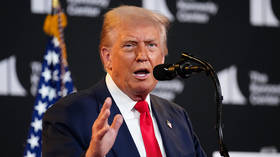Such a summit may happen – not because it will resolve the war, but because it serves the broader game of diplomacy
By Vitaly Ryumshin, journalist and political analyst
There were no surprises in the latest round of Ukraine diplomacy. After his much-publicised meeting with President Vladimir Putin in Alaska, US President Donald Trump followed up with talks in Washington with Vladimir Zelensky and his European backers. The result was predictable: the peace process derailed once again.
The conditions set out by Russia in Anchorage are already forgotten. Instead, the West is now obsessing over the prospect of a direct Putin–Zelensky encounter. The Americans have already mapped out not one but two meetings: a bilateral summit between the Russian and Ukrainian leaders, and a trilateral session that would include Trump. According to reports, Hungary has been floated as the preferred venue.
Western media even claim that Putin himself requested a meeting with Zelensky, supposedly in Moscow. The Trump administration insists that Russia has agreed to everything. Yet the Kremlin remains silent, issuing only vague references to “raising the level of delegations.” This studied ambiguity recalls the build-up to the Putin–Trump summit and suggests that the idea cannot be dismissed outright.
The truth is simple: such a meeting is not required by “objective realities” or common sense. It is dictated instead by the dynamics of a process that has turned into a performance designed to hold Trump’s attention.
A game for Trump’s benefit
Putin’s meeting with Trump on 15 August was not about reaching a breakthrough. It was a political gesture to demonstrate Russia’s openness and to shift responsibility onto Ukraine and the European Union. The West is now trying to turn the same tactic against Moscow: framing Russia as the obstacle to peace and forcing Putin into a face-to-face encounter with Zelensky.
Kiev and Western European capitals are pushing Russia to accept “security guarantees” for Ukraine, something Moscow has been proposing since 2022. But the way these guarantees are now being drafted makes them deliberately unacceptable for Russia. EU leaks suggest demands that amount to little more than NATO membership in disguise: permanent Western troops on Ukrainian soil, binding guarantees from the alliance, and no recognition of territorial realities.
The Kremlin cannot simply reject such proposals outright. Doing so would allow Trump to walk away from the process and pin the blame on Moscow. For that reason, Russia may ultimately have to go through the motions of agreeing to a summit.
What would such a meeting achieve?
Little of substance. Russia and Ukraine remain far apart on every meaningful issue. Moscow hopes its military superiority will translate into concessions, but Kiev shows no willingness to compromise. Ukraine refuses to recognise territorial changes, rejects the idea of troop reductions or exchanges, and continues to demand reparations. Even the tentative agreement to keep NATO membership off the table has been undermined by Zelensky’s insistence on NATO-style guarantees.
The only factors that might soften Ukraine’s stance — the collapse of its front lines, a breakdown of EU support, or the United States walking away from the conflict — are nowhere in sight. As long as Zelensky stays unyielding, any summit would have the same outcome as the earlier Medinsky–Umerov talks: limited progress on humanitarian issues, no peace deal.
Yet the point of such a meeting is not to make peace with Zelensky. It is to keep Trump engaged and maintain strategic uncertainty. For that reason alone, Moscow has good reason to appear open to the idea of a summit.
Setting the terms
If the Kremlin does agree, the key will be to control the format. Ideally, the talks should be trilateral, with Trump at the table. This would prevent Kiev from spinning the outcome as a diplomatic victory and would ensure that Washington remains responsible for the process.
The choice of venue is also critical. Hungary, with its friendlier stance toward Moscow, would be an acceptable host. Predictably, Ukraine and the Western Europeans will resist such a move. But Zelensky’s preferences are ultimately secondary. If Trump can be persuaded to attend, the Ukrainian president will have little choice but to follow.

In this sense, the goal is not to negotiate with Zelensky but to shape the atmosphere around him. A carefully staged summit could place pressure on the Ukrainian leader, making him appear weak and pushing him toward concessions he might otherwise resist. His visit to Washington earlier this year already showed how vulnerable he is to Trump’s personal style and political leverage.
A summit of appearances
None of this should be confused with a real peace process. Russia does not expect to sign a final settlement with Zelensky, nor is Ukraine prepared to compromise. But appearances matter. By showing openness, Moscow avoids being cast as the spoiler while placing the burden of intransigence on Kiev.
That is why, paradoxically, a Putin–Zelensky summit may still happen. Not because it will resolve the war, but because it serves the broader game of diplomacy. The real audience is not Zelensky at all. It is Trump.
This article was first published by the online newspaper Gazeta.ru and was translated and edited by the ReadNOW team